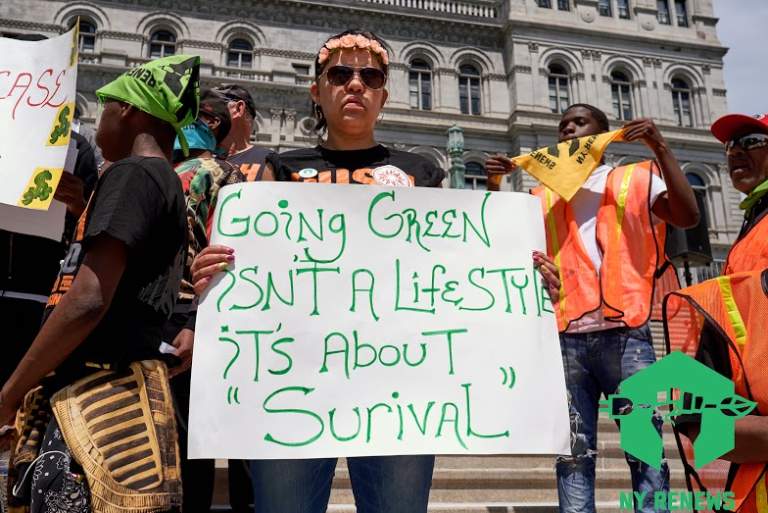
Allies from across the state rallied in Albany on June 1 for the New York State Climate and Community Protection Act.
Ecological Justice
Op-Ed: "Low-income New Yorkers take brunt of climate change"
Published June 7, 2016
From the Albany Times Union:
By Hector Figueroa and Franchelle Hart
Monday, June 6, 2016
The climate crisis is bad and getting worse. Last year was the hottest on record,and 2016 is off to a new record-setting pace. The warmer temperatures mean crops are withering, heat waves are intensifying and sea levels are rising.
None of us can escape the broad reach of global warming. But that doesn't mean it impacts all of us equally.
For years, low-income, of-color, immigrant and other vulnerable communities have been the first and worst impacted by the climate crisis. During Hurricane Katrina, a majority of New Orleans experienced catastrophic flooding and devastation, but it was the lower Ninth Ward that was ravaged, and predominantly poor families who lost their homes and loved ones.
We all remember the images of people stranded on their roofs, begging for help or wading through waist-deep water to try and get to safety. But even after the waters
receded, trouble remained. Promised insurance and Road Home money never came, and tens of thousands of people were forced to live in FEMA-issued trailers, which were later found to contain high levels of toxic formaldehyde.
New York isn't immune from the uneven toll of the climate crisis either. Hurricanes Irene and Sandy caused severe devastation upstate and down. Irene spilled raw sewage into the streets and water supply, downed public transit, knocked out power to hospitals and tens of thousands of New York families, and forced hundreds of thousands more to evacuate their homes. Families with the means were able to ride out the storm at a hotel, drink bottled water and drive to work instead of taking the train. But not everybody had those options. Nurses, cops, doormen and firefighters, for example, didn't have the luxury of being home with their families, and minimum wage workers could hardly afford to take a cab to work or to a hospital across town.
In New York City, Sandy displaced low-income renters and destroyed public housing, leaving thousands stranded for weeks without food, heat, medicine or running water. Nearly half of the city's 40,000 public-housing residents were displaced by Sandy and in the aftermath, it was low-income renters who were vulnerable to being left without affordable housing.
These storms cost billions of dollars in damages and took many lives, but it was our most disadvantaged who had it the hardest: Nearly half of the New York and New Jersey households that asked for federal aid after Sandy reported annual incomes of less than $30,000.
These storms aren't the only impact climate change has had on working families. Extreme winters have taken a toll on apple orchards and hurt farmers' ability to keep their land. Upstate tourism continues to suffer the effects of unusual weather patterns. And Jonah, New York City's largest blizzard on record last year, prevented millions of hourly workers — those most likely to be living paycheck to paycheck — from getting to their jobs and earning money.
Clearly there's an urgent need to address not only the environmental, but the racial and economic justice impacts of the climate crisis. And we can begin to do that by investing in green jobs, public transportation, rebuilding our infrastructure.
But it is not just about retrofitting and adapting to the rising sea levels that threaten so many of our residents and businesses. We need to be proactive in demanding good jobs upstate and downstate and leading the nation in moving to a greener and more responsible model of sustainable development.
That's why more than 50 labor, grass-roots, and environmental groups from across the state are joining forces in a first-of-its-kind coalition to tackle the crisis. We're community leaders, grass-roots activists, unions and environmental justice advocates. We're immigrants. We're workers. We're people of color. And we can't afford to wait around for more tragedy to strike.
On June 1, 1,000 of us converged on the Capitol to urge the Legislature and Gov. Andrew Cuomo to make good on his commitment to a clean, renewable energy future by supporting the New York State Climate and Community Protection Act. It would codify legally enforceable emissions standards that would improve our air and our health. It would invest in green infrastructure and good green jobs to improve our economy. And it would set New York on the path toward a 100 percent clean, renewable economy by 2050.
It's the strongest climate protection legislation in the nation, and would put New York at the forefront of U.S. climate action. We're united in our commitment to tackling this crisis. None of us has the luxury of thinking climate change is someone else's problem, not even Albany.
More Information:
Héctor Figueroa is president of 32BJ SEIU. Franchelle Hart is executive director of Open Buffalo.